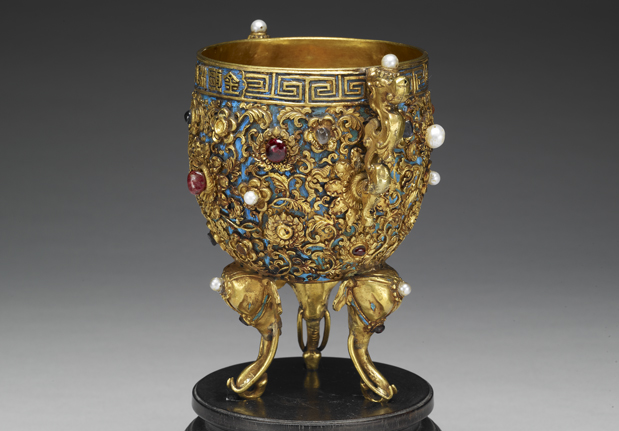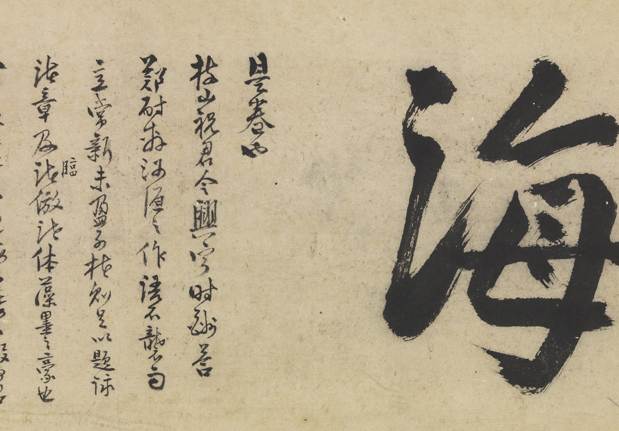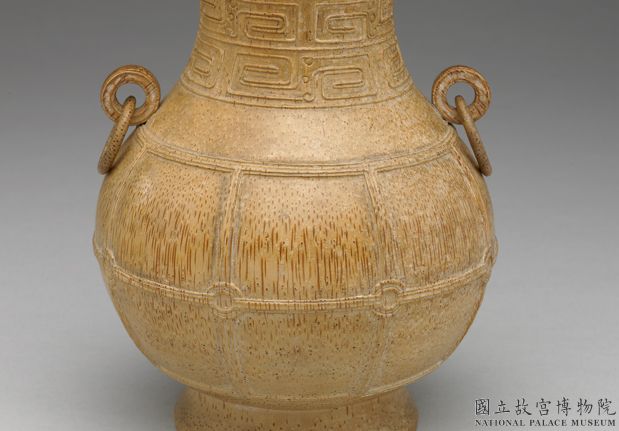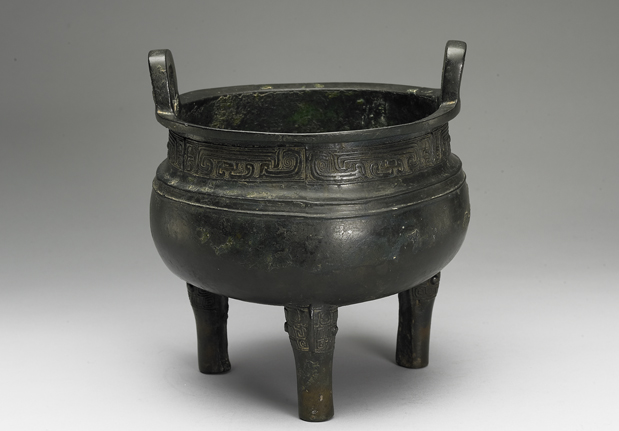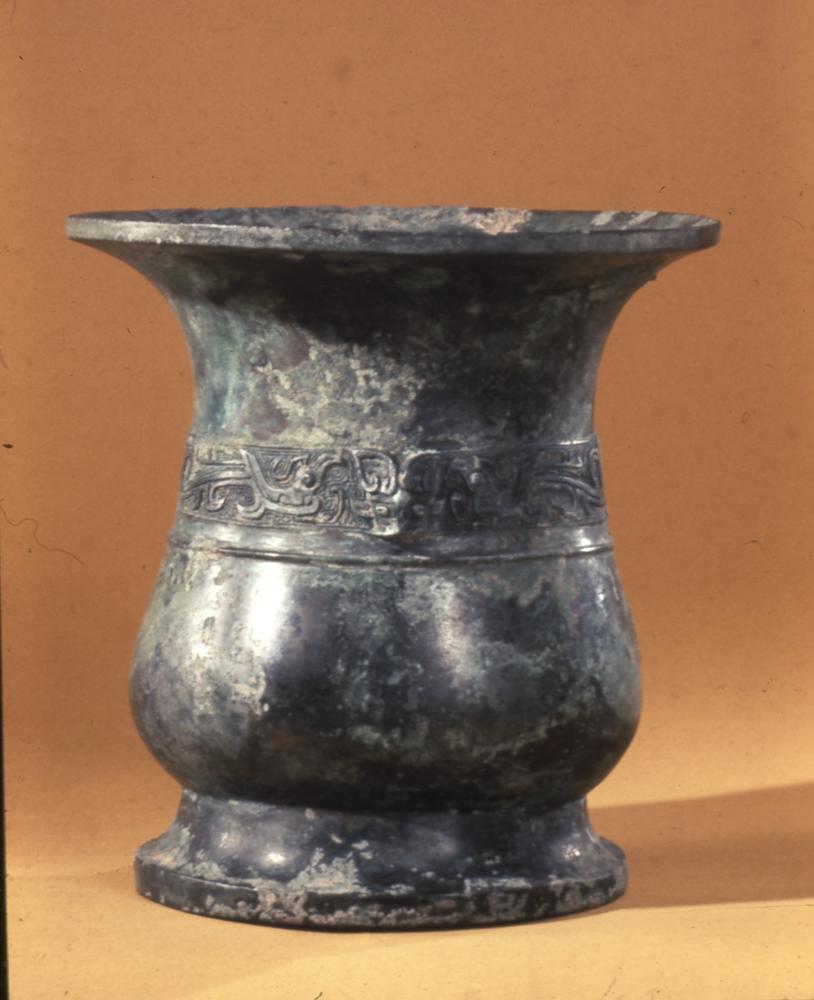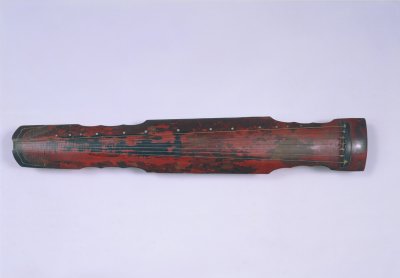Period:Ming dynasty Production date:1573-1620
Materials:porcelain
Technique:glazed, biscuit-fired, painted,
Subjects:equestrian insect procession
Dimensions:Diameter: 16.80 centimetres Height: 26 centimetres
Description:
‘Gu’-shaped porcelain vase decorated in enamels on the biscuit. This vase has a trumpet mouth, long neck, drum body and high flared foot with flanges attached on either side at each section. It is painted on the biscuit with purplish-brown designs, outlined in black, on a mustard-yellow ground. Inside the mouth are chrysanthemums. Outside the decoration is divided into three registers: the upper section is painted with tree peonies growing by rocks and with a border of dragonflies, moths and butterflies; the central part shows on both sides a procession with a kneeling man presenting gifts to a gentleman on horseback who is followed by two servants, one carrying a fan and the other books, with a border of ‘ruyi’ clouds; the lower section has flower sprays and a double border of scrolling foliage and ‘ruyi’ clouds. The recessed base bears a six-character Wanli reign mark within a double ring.
IMG
![图片[1]-vase BM-Franks.1479-China Archive](https://chinaarchive.net/Ming dynasty/Ceramics/mid_00260971_001.jpg)
Comments:Harrison-Hall 2001:The form of the vase is loosely based on an ancient bronze drinking vessel called a ‘gu’. The figures may derive from a popular vernacular Chinese story or legend as yet unidentified. The theme of an official being presented with gifts by a subordinate is both widespread and auspicious. Two almost identical vases were discovered interred in the Ding Ling, the stone tomb of the emperor Wanli, his empress and concubine. Those vases were positioned on the northern side of the outer coffin of the Wanli emperor. Other vases of this type are in the Yamato Bunkakan in Nara and the Musee Guimet, Paris.
Materials:porcelain
Technique:glazed, biscuit-fired, painted,
Subjects:equestrian insect procession
Dimensions:Diameter: 16.80 centimetres Height: 26 centimetres
Description:
‘Gu’-shaped porcelain vase decorated in enamels on the biscuit. This vase has a trumpet mouth, long neck, drum body and high flared foot with flanges attached on either side at each section. It is painted on the biscuit with purplish-brown designs, outlined in black, on a mustard-yellow ground. Inside the mouth are chrysanthemums. Outside the decoration is divided into three registers: the upper section is painted with tree peonies growing by rocks and with a border of dragonflies, moths and butterflies; the central part shows on both sides a procession with a kneeling man presenting gifts to a gentleman on horseback who is followed by two servants, one carrying a fan and the other books, with a border of ‘ruyi’ clouds; the lower section has flower sprays and a double border of scrolling foliage and ‘ruyi’ clouds. The recessed base bears a six-character Wanli reign mark within a double ring.
IMG
![图片[1]-vase BM-Franks.1479-China Archive](https://chinaarchive.net/Ming dynasty/Ceramics/mid_00260971_001.jpg)
Comments:Harrison-Hall 2001:The form of the vase is loosely based on an ancient bronze drinking vessel called a ‘gu’. The figures may derive from a popular vernacular Chinese story or legend as yet unidentified. The theme of an official being presented with gifts by a subordinate is both widespread and auspicious. Two almost identical vases were discovered interred in the Ding Ling, the stone tomb of the emperor Wanli, his empress and concubine. Those vases were positioned on the northern side of the outer coffin of the Wanli emperor. Other vases of this type are in the Yamato Bunkakan in Nara and the Musee Guimet, Paris.
© Copyright
The copyright of the article belongs to the author, please keep the original link for reprinting.
THE END
